According to GCV Analytics, in February, the number of corporate-backed deals from around the world stood at 490, up 55% from the 316 rounds from the same month last year. Investment value stood at $20.9bn in total estimated capital – nearly double the $12.01bn of February 2021. The US came first in the number of corporate-backed deals, hosting 206 rounds, while Japan was second with 45 and China third with 23.

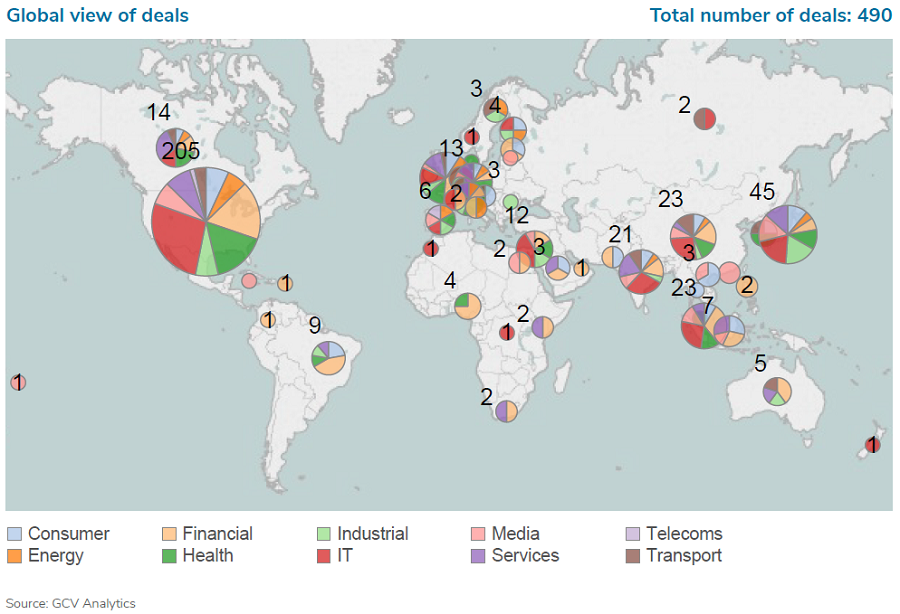
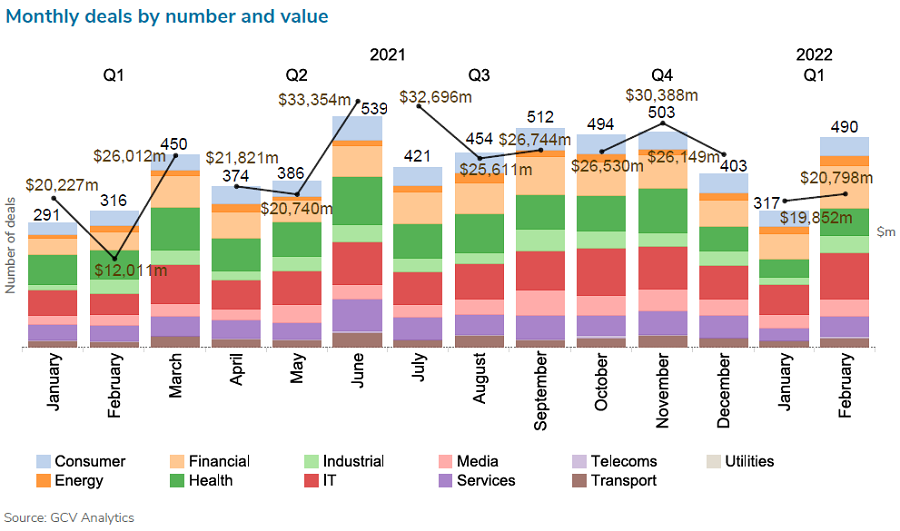
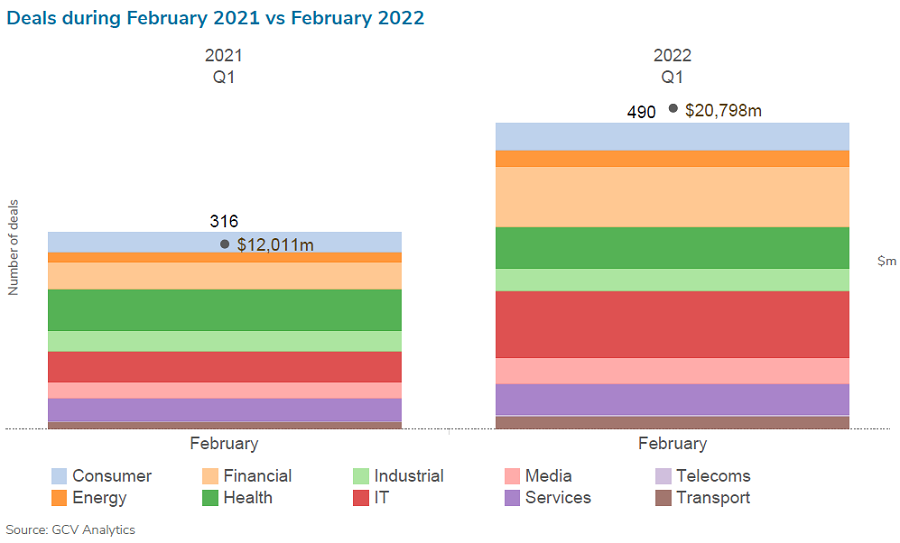
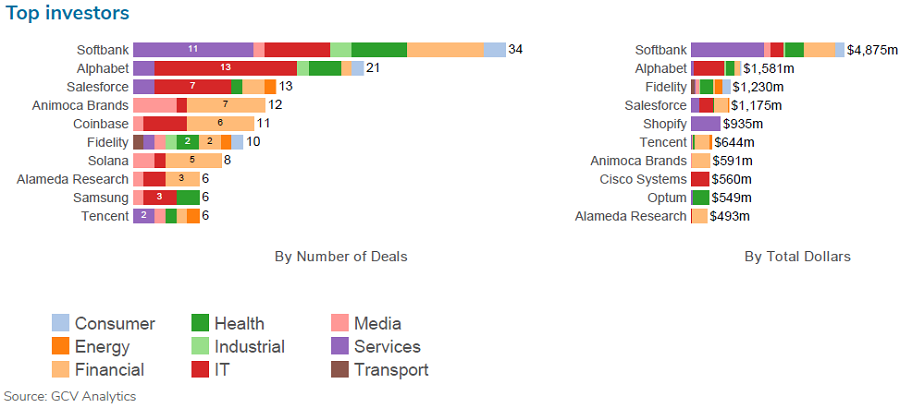
The leading corporate investors by number of deals were telecoms and internet conglomerate SoftBank, diversified internet conglomerate Alphabet as well as cloud technology and enterprise software provider Salesforce. In terms of involvement in the largest deals, Softbank, Alphabet and financial services firm Fidelity were on the top of the list.
GCV Analytics reported 49 corporate-backed funding initiatives, including VC funds, new venturing units, incubators, accelerators and other. This figure was 36% higher than the one from February 2021, which had registered 36 such initiatives. The estimated capital stood at $4.95bn, nearly 64% more than the $3.02bn from the same month last year.
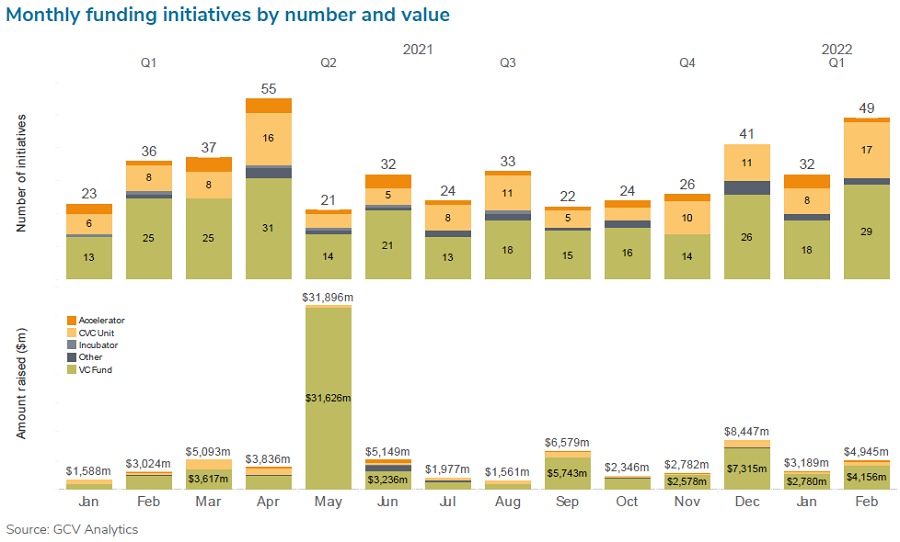
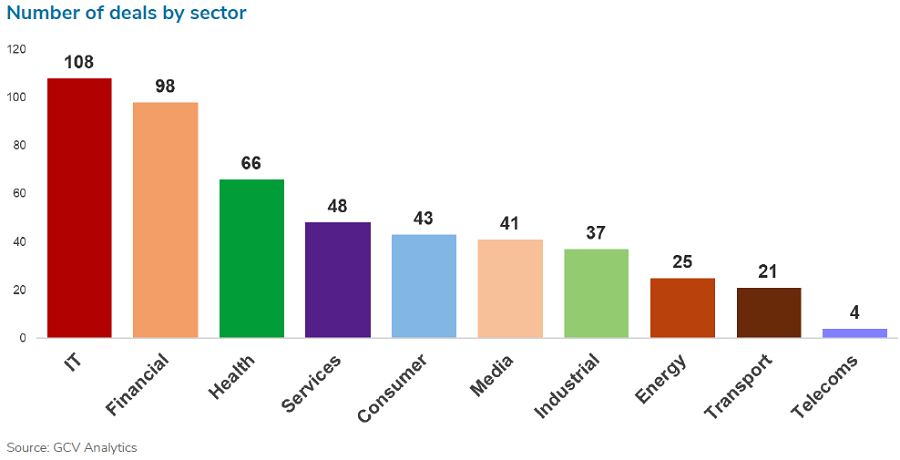

Deals
Emerging businesses from the IT, financial, health and services sectors led in raising the largest number of rounds in second month of 2022. The most active corporate venturers came from the financial, IT, media and telecoms sectors, as shown on the heatmap.

US-based logistics services platform developer Flexport raised $935m in a series E round featuring SoftBank and e-commerce software provider Shopify at a valuation of $8bn post-money. Andreessen Horowitz and MSD Partners co-led the round with additional backing from DST Global, Founders Fund, private investor Kevin Kwok and undisclosed others, while SoftBank invested through its Vision Fund 1. Founded in 2013, Flexport operates a cloud-based logistics system allowing customers to book shipments by air, sea, land or rail globally, offering end-to-end cargo insurance, real-time tracking and all-inclusive billing. It claims the platform was responsible for moving almost $19bn in merchandise across 112 countries in 2021, as its revenue more than doubled.
Internet group Tencent co-led a $497m series B round for Italy-based buy now, pay later (BNPL) service Scalapay at a valuation of over $1bn. The round was co-led by Willoughby Capital and included Tiger Global Management, Moore Capital, Deimos Capital, Gangwal and Fasanara Capital. It took the company’s total funding to over $700m. Founded in 2019, Scalapay provides a payment service that lets shoppers stagger their payments across multiple instalments at no interest. The product is already used by retailers such as Moschino, Decathlon, Nike, Samsonite and Pandora, and the company aims to double its headcount by the end of 2022 and expand its recently launched checkout cashback tool, Magic.
Polygon, an India-based scaling platform for the Ethereum network, secured $450m through a private token sale featuring SoftBank and blockchain entertainment product developers Alameda Research and Animoca Brands. The deal, a private sale of Polygon’s MATIC token, was led by Sequoia Capital India and included cryptocurrency exchange Bitfinex, mobile video game publishers Voodoo and Scopely, online education provider Unacademy and cryptocurrency lender Celsius. Founded in 2017 as Matic, Polygon provides a digital platform that allows developers to create scalable decentralised apps with low transaction fees that are compatible with the Ethereum blockchain. The company will use the proceeds to develop its product and invest further in zero knowledge technology, a cryptographic verification mechanism to which it has committed $1bn.
Uniphore, a US-based conversational automation technology provider backed by networking technology producer Cisco, energy supplier National Grid and conglomerate Sistema, raised $400m in a series E round led by New Enterprise Associates and backed by new and existing investors, with only March Capital named. The round valued the company at $2.5bn and it followed a $140m series D in March 2021 that increased its overall funding to $210m. Founded in 2008, Uniphore has built software that helps businesses improve the performance of their customer support staff. It relies on artificial intelligence and natural language processing technologies to power voice-based services such as conversational analytics, a virtual assistant and voice authentication.
SoftBank’s Vision Fund 2 has co-led a $330m funding round for ElasticRun, the India-based operator of a business-to-business (B2B) e-commerce platform. The round was co-led with investment banking firm Goldman Sachs’ Asset Management division and also featured internet group Prosus’s corporate venturing unit, Prosus Ventures, along with Chimera and InnoVen Capital. It valued the company at $1.5bn post-money and the announcement followed earlier reports that the company had raised $300m in equity funding and $32m through a secondary share sale. Launched in 2016, ElasticRun sells fast-moving consumer goods to small local businesses, connecting them with e-commerce companies, particularly in rural areas. It will use the funds to expand its rural network, with a view to doubling its customer base to 1 million local stores over the next year.
US-based kidney disease care service Somatus received more than $325m in a series E round featuring health insurers Anthem and BlueCross BlueShield Association, prescription manager Optum and hospital operator Inova Health System, among other investors. Blue Venture Fund and Optum Ventures represented BlueCross BlueShield Association and Optum while Anthem and Inova Health System invested directly. The round took the company’s overall funding to about $500m and valued it above $2.5bn. Asset manager Wellington Management led the round. Founded in 2016, Somatus provides home care services for chronic kidney or end-stage renal disease patients, teaming up with health insurers, health systems, nephrology and primary care providers.
Brazil-based digital bank Neon Pagamentos agreed $300m in series C funding from investors including online payment processor PayPal and Propel Venture Partners, the venture capital firm funded by banking group BBVA. PayPal invested through corporate VC unit PayPal Ventures. Growth equity firm General Atlantic led the round, which also featured Vulcan Capital, Endeavor Catalyst, Monashees, Flourish Ventures and funds and accounts managed by BlackRock. Founded in 2016, Neon offers a digital bank account in addition to credit cards, loans and investment products for both consumers and businesses. It oversees 9 million accounts and will put the series C proceeds into technology and product development, recruitment and expanding that user base.
TTTech Auto, an Austria-based provider of safety software for autonomous vehicles, received $285m in funding from car producer Audi and automotive technology producer Aptiv at a valuation exceeding $1bn. Aptiv put in the lion’s share of the funding, contributing $228m, while Audi is strengthened its existing stake in the company with an additional $57m. Spun out of Vienna University of Technology in 1998, TTTech develops safety hardware and software for self-driving cars. The company plans to use the capital to improve its MotionWise safety software product, which is designed to help automotive manufacturers shorten the development of their cars by managing the multitude of data inputs an autonomous vehicle needs to handle. TTTech will also put the proceeds toward expand its wider product portfolio and its business in Asia, North America and Europe as well as exploring strategic investments and acquisitions.
Canada-based academic support software provider Paper completed a $270m series D round consisting of both primary and secondary funding, with Softbank’s Vision Fund 2 co-leading it with venture capital firm Sapphire. They were joined by Salesforce Ventures, a subsidiary of enterprise software producer Salesforce, as well as IVP, Framework Venture Partners, Bullpen Capital, Reach Capital, BDC Capital and Red House Education. Founded in 2014 as GradeSlam, Paper operates an online educational support system through which school students can access on-demand homework help and feedback across more than 200 academic subjects. The company claims its platform has supported more than 1 million students across North America, and it will use the funding to grow its business and invest in its software platform.
Volta Trucks, a Sweden-based developer of commercial electric vehicles (EVs), secured €230m ($260m) in series C funding from investors including logistics services provider Agility. Luxor Capital led the round and was also joined by real estate holding company Byggmästare Anders J Ahlström and B-Flexion. Founded in 2017, Volta is developing a 16-tonne fully electric freight vehicle for urban logistics and has pre-orders in excess of 5,000 units in place and an orderbook value of over $1.36bn. Logistics services provider DB Schenker pre-ordered nearly 1,500 of the trucks in November 2021, a transaction billed as the largest zero-emission truck order in Europe to date. The company will use the proceeds to fund its engineering and operations through the start of the production of its vehicles at the end of this year, covering the production of design verification prototypes and further tests.
Exits
GCV Analytics tracked 35 exits involving corporate venturers as either acquirers or exiting investors in February. The transactions included 30 acquisitions, three initial public offerings (IPOs), one other transaction and one merger of equals.
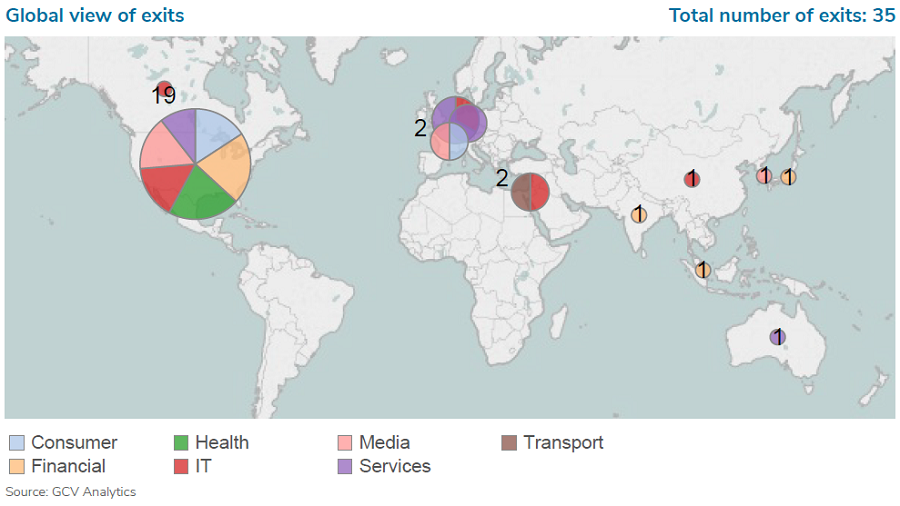
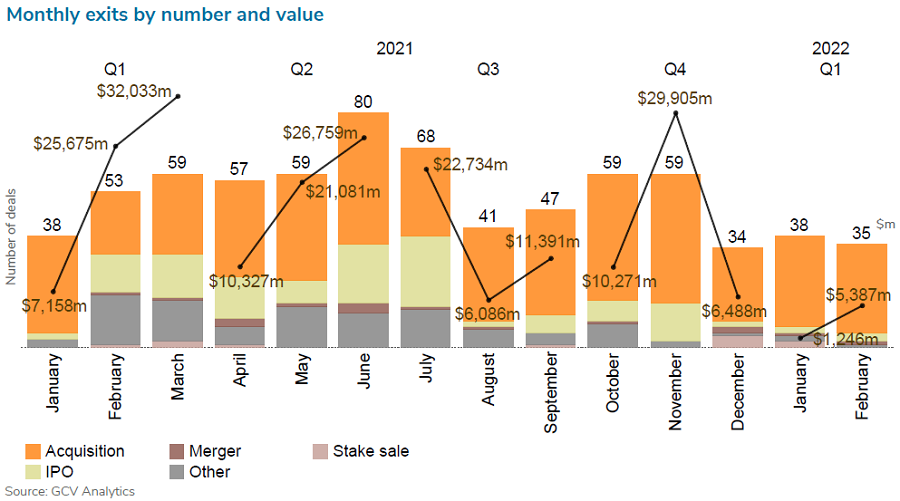
The exit count was considerably lower than the February 2021 figure (53). The total estimated exited capital stood at $5.39bn, considerably smaller than the $25.68bn from same month from last year. These figures suggest that public and M&A market are not as buoyant as last year.
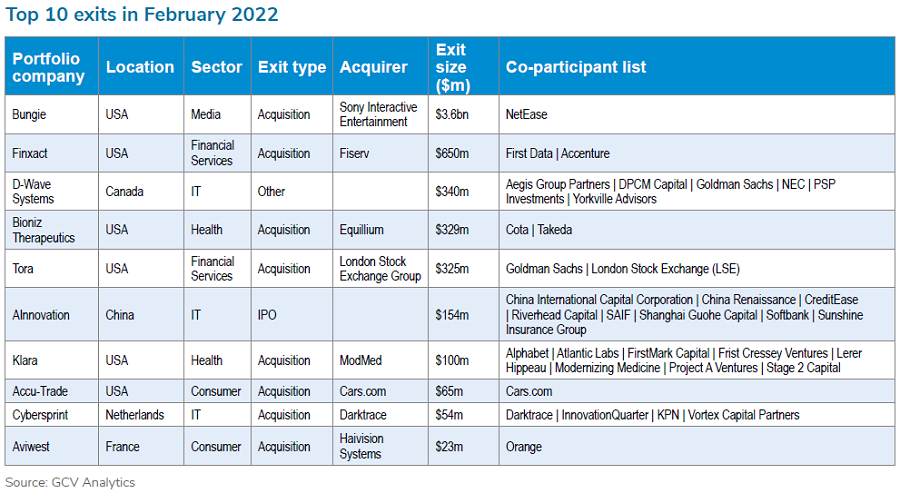
Sony Interactive Entertainment (SIE), a subsidiary of electronics group Sony, agreed to acquire US-based video game developer Bungie in a $3.6bn deal allowing internet and online gaming company NetEase to exit. Bungie, which was founded in 1991 and is responsible for the creation of the Halo and Destiny game franchises, will operate as an independent subsidiary of SIE following the acquisition. The news came two weeks after the announcement of an even larger rival deal: the planned $68.7bn takeover of Activision Blizzard, the studio that oversees game franchises including Call of Duty, World of Warcraft, Guitar Hero and Candy Crush, by Microsoft, producer of the Xbox gaming consoles.
Payment technology producer Fiserv agreed to pay $650m to purchase the remainder of the shares of portfolio company Finxact, a US-based provider of banking software. Fiserv had not previously revealed details of its investment, Finxact having most recently raised $32.8m from unnamed investors in February 2021, according to a securities filing. Founded in 2016, Finxact has built a cloud-based banking platform designed to provide a solution to banks and credit unions who want to own their stack and data. The company’s platform uses Google-derived open-source high-performance language Golang and SQL alternative databases to feature cloud banking facilities in the public cloud along with a completely open core banking API, enabling banks to freely deliver new services to digital consumers at a low cost.
D-Wave Systems, a Canada-based quantum computing technology developer backed by IT equipment producer NEC, agreed to a $1.6bn reverse merger with special purpose acquisition company DPCM Capital. The deal valued the company at $1.2bn pre-merger and the merged business, D-Wave Quantum, will take the New York Stock Exchange listing acquired by DPCM in a $300m initial public offering in late 2020. The deal was backed by $40m private investment in public equity (PIPE) financing provided by NEC, investment bank Goldman Sachs, PSP Investments, Yorkville Advisors and Aegis Group Partners. Founded in 1999, D-Wave produces full-stack quantum systems supporting hardware, post-processing software and developer tools. The transaction is the third large reverse merger agreed by a corporate-backed quantum computing technology developer in the past year, after IonQ in March and Rigetti in October.
Biotech company Equillium bought US-based immuno-inflammatory disease drug developer Bioniz Therapeutics for approximately $329m – of which about $22m million in stock and up to $57.5 million in development biobucks and a further up to $250 million in commercial milestone payments. Bioniz had raised $14.3m as of a $13m series A round in 2016 co-led by pharmaceutical firm Takeda’s corporate VC unit, Takeda Ventures, and David Pyott that included Cota Capital and Joe Kiani. Founded in 2010, Bioniz has developed a multi-cytokine inhibitory therapeutics designed to address immuno-inflammatory diseases and cancer treatment. It has developed novel peptides that selectively and simultaneously inhibit functionally redundant cytokines by blocking their unique binding interface with their shared receptor, enabling medical practitioners to treat patients with cancer and autoimmune diseases effectively.
Financial exchange operator London Stock Exchange Group agreed to pay $325m to acquire Tora, a US-headquartered provider of trade execution and portfolio management software, enabling investment banking firm Goldman Sachs to exit. Goldman Sachs was one of two investors which had provided a total of $36.4m for the company in 2010 according to a securities filing. Founded in 2004, Tora has developed a cloud-based front-to-back office technology platform designed to support the full trading lifecycle. The platform provides portfolio, order and execution management systems as well as compliance and analytics engines, enabling brokers, hedge funds and traders to execute trading.
SoftBank exited China-based artificial intelligence technology provider AInnovation in an IPO in Hong Kong, following in peer SenseTime’s footsteps. AInnovation raised HK$1.2bn ($154m) in the IPO, pricing 44.7 million new shares at the bottom of their HK$26.30 to HK$27.30 range on its first day of trading. The company’s market capitalisation stood at about $11.2bn. Incubated in 2018 by venture capital firm Sinovation Ventures, AInnovation has built an AI software platform that enables enterprise customers operating in traditional industries such as finance and manufacturing to digitalise their businesses.
Healthcare management software producer ModMed purchased Klara, the US-based developer of a communication software platform for medical patients, for an amount reported to be about $100m, enabling internet technology provider Google to exit. Klara had raised $32m as of August 2020 when Google’s Gradient Ventures fund co-led a $15m round with Frist Cressey Ventures, investing alongside FirstMark Capital, Lerer Hippeau, Project A Ventures and Stage 2 Capital. Founded in 2013, ModMed has developed an end-to-end virtual care platform designed to help practitioners stay connected with their patients.
Automotive e-commerce marketplace Cars.com agreed to purchase US-based vehicle valuation and appraisal software developer Accu-Trade for $65m in cash, providing an exit for automotive data provider TrueCar. Cars.com anticipates the deal will be boosted by a $63m earn-out payment, and it comes after TrueCar paid an undisclosed amount for a 20% stake in the company in 2019. Founder 2013, Accu-Trade has developed vehicle valuation and appraisal technology designed to connect consumers to the best buyer for their vehicle. The company’s platform offers instant lead capture, value-based CR, spot-on pricing, mobile appraisals and comprehensive dealer reporting service.
Cybersecurity software producer Darktrace agreed to purchase Cybersprint, a Netherlands-based developer of software which provides attack surface insights to aid in the security process, in a $53.7m deal enabling telecoms firm KPN to exit. The corporate’s KPN Ventures subsidiary had joined fellow existing investors InnovationQuarter and Vortex Capital Partners in a $2m round in September 2020 that took Cybersprint’s overall funding to just over $5m. Founded in 2015, Cybersprint has built a cybersecurity compliance platform designed for attack surface management. The platform automatically maps a company’s attack surface on a continuous basis, detects and prioritises relevant risks to prevent high-impact incidents.
Video streaming service Haivision Systems agreed to acquire Aviwest, a France-based peer backed by telecoms firm France Telecom-founded Innovacom fund, for €20.5m ($23m), conditional on regulatory adjustments. Founded in 2008, Aviwest has developed an internet protocol (IP)-based video contribution system, which can be used with any portable, on-the-move, in-vehicle, or fixed location video contribution application, enabling broadcasters, content producers, and television stations to seamlessly produce live video content.
Note: Monthly data can fluctuate as additional data is reported after each issue of GCV magazine goes to press.
